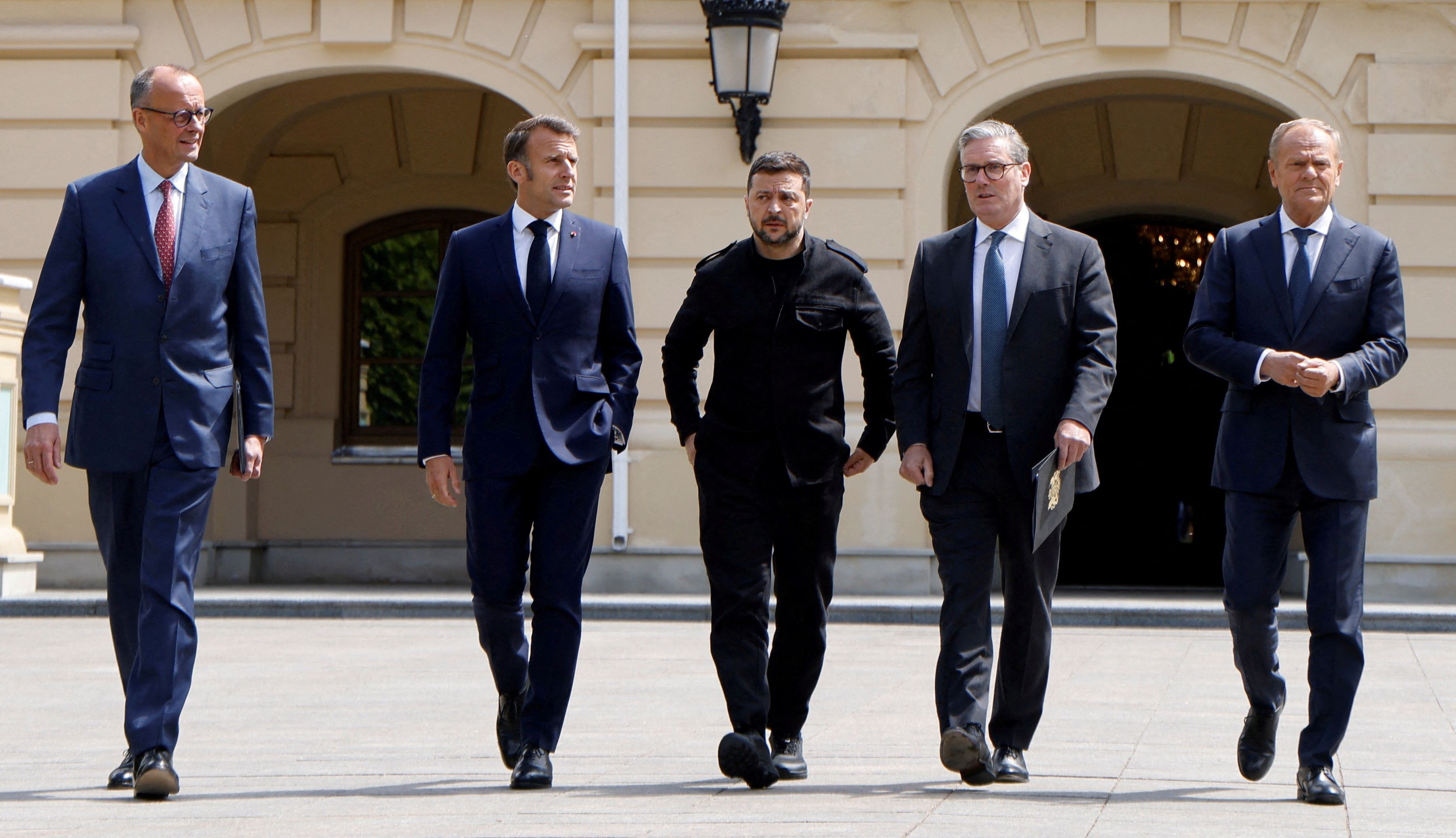As the Istanbul peace talks get underway, Europe’s response to the Russia-Ukraine war exposes its profound weakness and reliance on U.S. support, with leaders like France’s Emmanuel Macron, Britain’s Keir Starmer, and Germany’s Friedrich Merz resorting to bluffs that lack substance.
The European trio, after visiting Kyiv and meeting with the Ukrainian President Volodymyr Zelenskyy on May 10, issued Russia a 30-day ceasefire ultimatum to begin on May 12, threatening severe sanctions in case of Moscow’s non-compliance. Russian President Vladimir Putin dismissed it, offering talks in Istanbul without a truce instead, in line with Russia’s insistence that the “root causes” of the conflict be addressed, including Ukraine’s potential NATO membership.
Kyiv and its European allies insisted that a ceasefire should precede talks. However, U.S. President Donald Trump’s call for immediate negotiations, sidestepping the ceasefire, upended their strategy and forced Zelenskyy’s attendance. Europe has exposed itself as being increasingly irrelevant, its strategies crumbling without American backing.
Zelenskyy plans to attend the talks in Istanbul aiming to appear peace-seeking and avoid being blamed by Trump for the failure to use the chance to end the war. Putin, for his part, scoffed at the threat of new sanctions, declaring, in reference to the Europeans: “They harm themselves with these moves, but they do it anyway, the fools.”
However, Moscow is also reluctant to alienate Trump and provoke an end of its nascent dialogue with Washington. So, while Putin will not attend the talks, he will send his aide Vladimir Medinsky who already was the head of the Russian delegation at the Istanbul talks in Spring 2022, where both sides reached a draft agreement. This signals Moscow’s determination to resume talks based on the same parameters as in 2022: Ukraine’s neutral status, security guarantees from all five permanent members of the U.N. Security Council (U.S., UK, France, Russia, and China) and reduction of Ukraine’s armed forces.
The question now is whether Zelensky will accept to negotiate with Medinsky, or will send his own aides, such as his foreign minister or the head of the presidential administration. Either way, it would only further expose Europe’s inability to steer the process.
Regardless of Kyiv’s decision, the EU’s 17th sanctions package, approved on May, exemplifies this lack of leverage. Including a ban on chemical exports for weapons, visa bans and asset freezes for Russian officials, trade restrictions on companies evading sanctions, and measures against nearly 200 oil tankers in Russia’s “shadow fleet,” the package was deemed so weak that Hungary and Slovakia — who long advocated for negotiations with Moscow to end the war — didn’t bother blocking it. Sweden and Finland noted parliamentary approval is needed, but no delays are expected.
EU diplomats admit that “massive” sanctions of the sort threatened by Macron or escalatory steps like sending German Taurus missiles to Ukraine lack credibility without U.S. support and would take too long to implement, allowing Moscow to dismiss them as a bluff. With gas phase-outs delayed until 2027 and internal divisions — Hungary’s and Slovakia’s resistance chief among them — Europe’s economic leverage seems even less convincing.
Macron’s posturing further underscores this weakness. He admitted France has exhausted its aid to Ukraine and cannot escalate support. He noted that frozen Russian assets cannot be confiscated due to legal barriers, warning that Moscow could reclaim them if sanctions falter — a damning admission of Europe’s fragility.
His proposal to deploy European troops in Ukraine, framed as an alternative to NATO membership, is another empty gesture. “We cannot leave Ukraine alone. Since it will not join NATO, we offer alternative guarantees,” Macron claimed, suggesting troops be placed in “strategically important points” away from the front for joint operations to create a “deterrence effect.”
Yet, he confirmed no combat role, and Russia’s repeated opposition to Western troops renders the idea toothless. Macron and Starmer concede the plan hinges on Kyiv-Moscow agreements, admitting its speculative nature. Starmer, echoing Macron’s rhetoric, offers no concrete commitments, while Merz, Germany’s new chancellor, pushes for sanctions and aid but lacks the fiscal or political clout to act unilaterally. Their collective strategy — threatening Russia with sanctions or troops — collapses without U.S. muscle. It also diverts the focus from what should be a serious conversation on realistic, achievable security guarantees for Ukraine.
As the EU threatens sanctions if Russia rejects a ceasefire, Europe’s diluted measures and lack of coordination with Washington expose the bluff. Trump’s proximity to Istanbul during a Middle East visit could see him intervene if talks show promise, reinforcing his role as the decisive player. Without U.S.-driven terms or a U.S.-Russia deal, Europe’s calls for peace along current lines are futile, as neither Moscow nor Kyiv sees their respective positions as too weak to agree to unfavorable terms.
If the Istanbul talks lead to some sort of an agreement, it is Trump who’ll be in a position to claim credit as he insisted on the talks to take place in the first place. If the talks fail, Trump’s reaction — escalating arms deliveries to Ukraine, pressuring Kyiv, maintaining limited support, or disengaging — will impact the war’s trajectory.
Europe, shackled by weak sanctions, exhausted resources, hollow proposals, and stubborn refusal to talk to Moscow has no independent path.

















